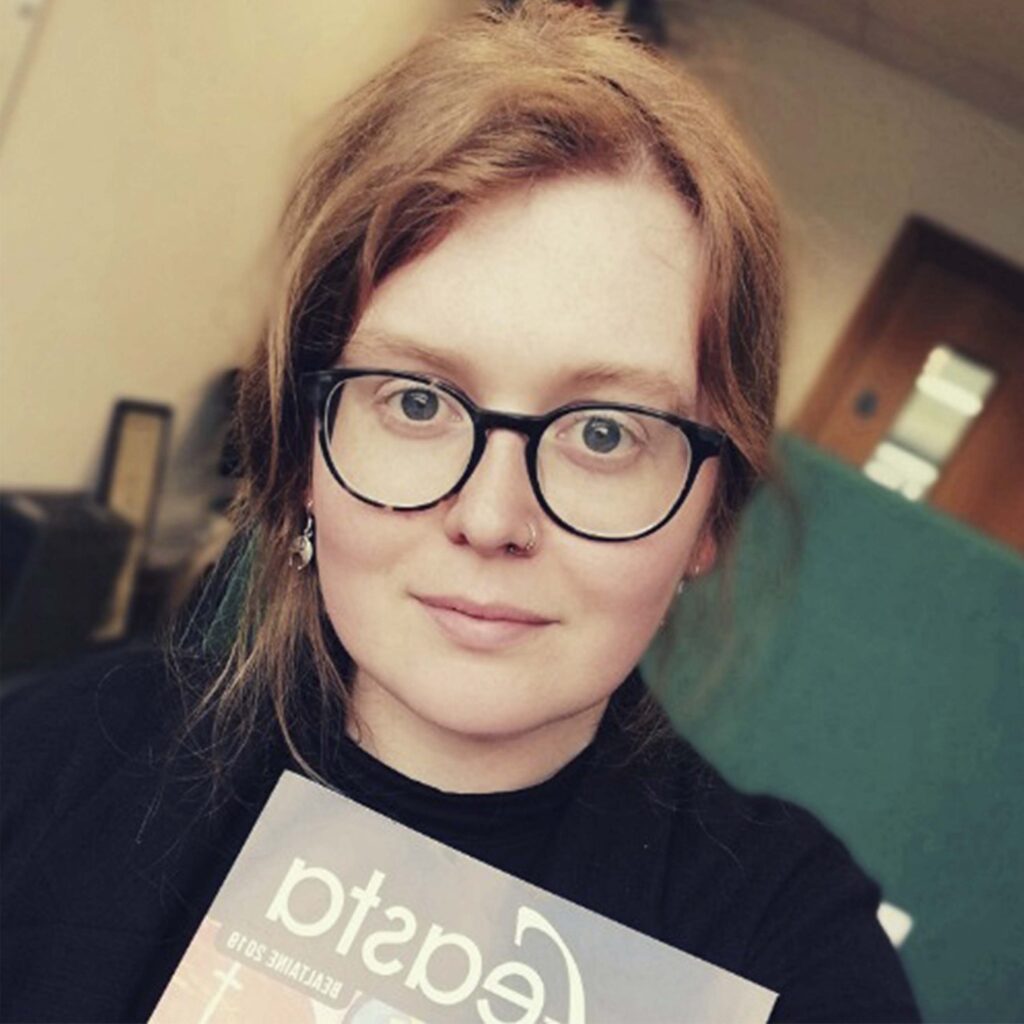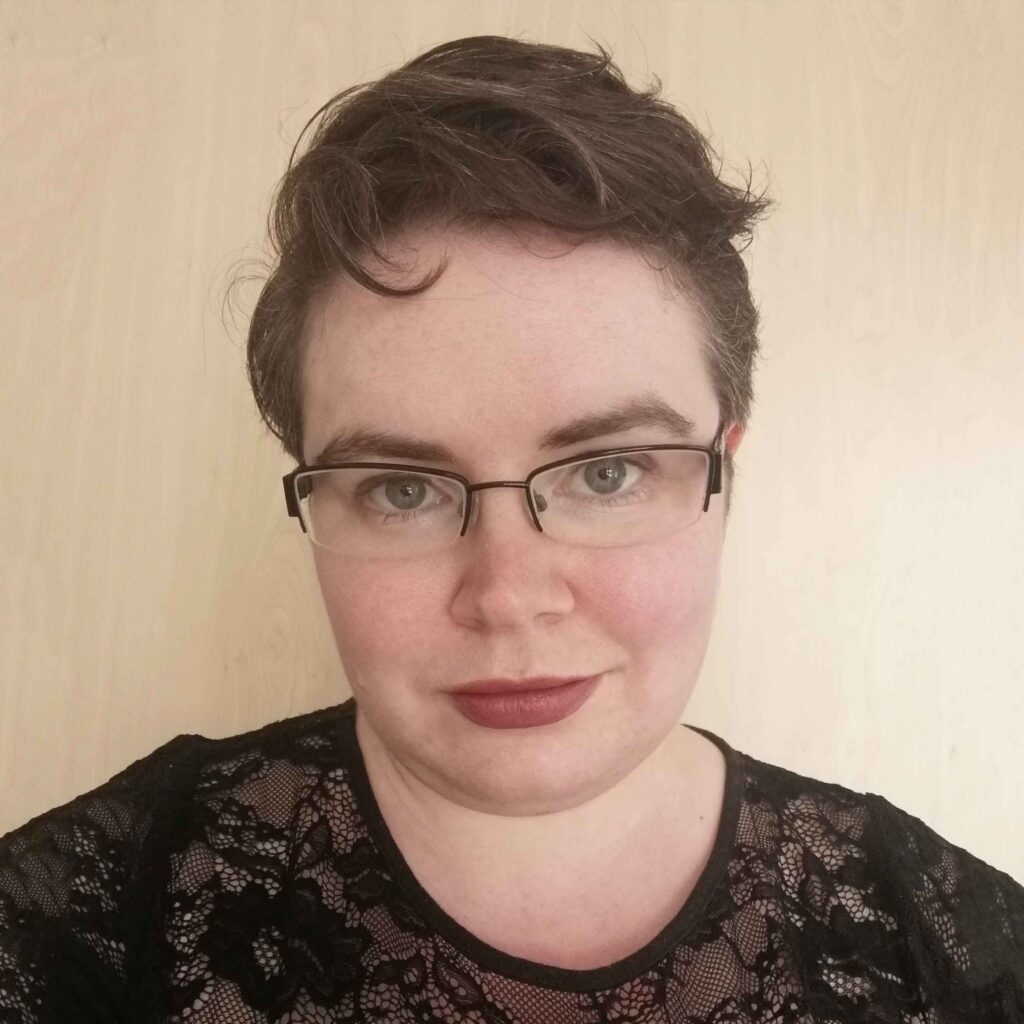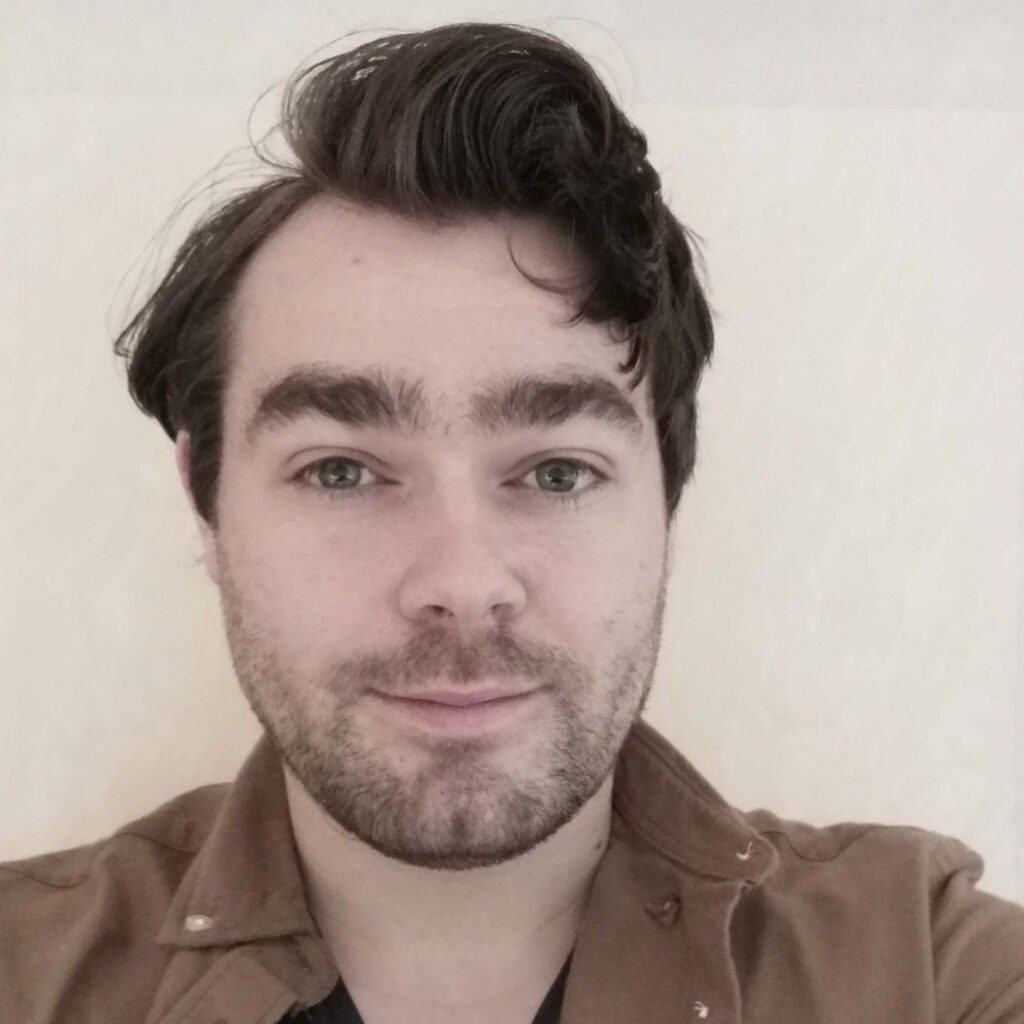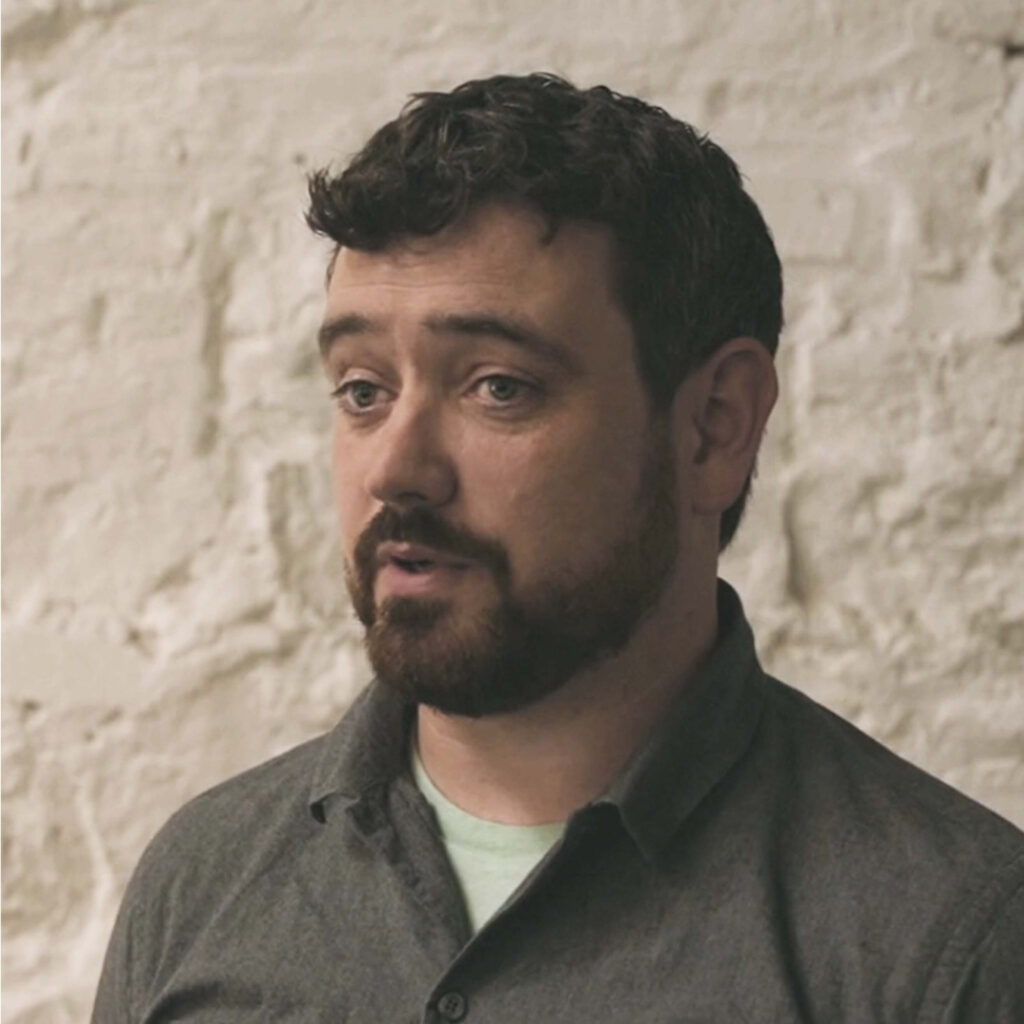
MEET THE TEAM
FOIREANN RoC

Is í Rióna Ní Fhrighil Príomhthaighdeoir an tionscadail ROC agus is léachtóir í in Ollscoil na hÉireann, Gaillimh. An fhilíocht chomhaimseartha agus an t-aistriúchán liteartha na príomhréimsí taighde atá aici. Sa tréimhse 2014-2016, bhí sí ina príomhthaighdeoir Gaeilge ar an mhórthionscnamh taighde ‘The Representation of Jews in Irish Literature’ a mhaoinigh AHRC. Comhstiúrthóir í ar an tionscadal ‘Aistriú’ (www.aistriu.eu), togra aistriúcháin agus ealaíne a bunaíodh agus Gaillimh ina Príomhchathair Chultúir na hEorpa (2020).
Rióna Ní Fhrighil is Principal Investigator of ROC and lecturer in Modern Irish at NUI Galway. She has published extensively on twentieth-century Irish poetry and literary translation, and is the author of Briathra, Béithe agus Banfhilí (2008), a monograph on the poetry of Nuala Ní Dhomhnaill and Eavan Boland. Rióna was the principal Irish-language researcher on the AHRC-funded project The Representation of Jews in Irish Literature (2014-2016). She is co-director of the interdisciplinary project Aistriú: crossing territories, languages,and artforms, funded by Galway 2020 as part its European Capital of Culture programme.

IrC Laureate Fellow (2018-2021)
Scoláire í an Dr Anne Karhio a bhfuil saineolas aici ar fhilíocht Bhéarla na hÉireann chomh maith leis an chultúr agus an litríocht dhigiteach. Céimí í de chuid Ollscoil Helsinki agus bhain sí PhD sa Bhéarla amach in Ollscoil na hÉireann, Gaillimh. Is í údar an leabhair Slight Return: Paul Muldoon’s Poetics of Space (2016) agus comheagarthóir Crisis and Contemporary Poetry (2011). Is í Anne príomhthaighdeoir na foirne ar fhilíocht Bhéarla na hÉireann.
Anne is a researcher in contemporary Irish poetry as well as digital literature and culture. She is a graduate of the University of Helsinki and holds a PhD in English from the National University of Ireland, Galway. She has published widely on contemporary Irish poetry, place and landscape, and digital media aesthetics. She is the author of Slight Return: Paul Muldoon’s Poetics of Space (2016), and co-editor of Crisis and Contemporary Poetry (2011). Anne leads ROC’s English-language work strand.
.

IrC Laureate Scholar (2018-2021)
Céimí de chuid Ollscoil na hÉireann, Gaillimh, í Laoighseach Ní Choistealbha. Bhain sí bunchéim sa Ghaeilge, sa Stair, agus sa Scríbhneoireacht Churthaitheach amach sa bhliain 2016 agus céim máistreachta sa Nua-Ghaeilge in 2017. I measc na nduaiseanna gradamacha a bhronn Ollscoil na hÉireann uirthi tá: Scoláireacht Liteartha an Dr Henry Hutchison Stewart don Ghaeilge in 2013; Scoláireacht Chiste Theach an Ard-Mhéara don Ghaeilge in 2016; Duais T.K. Whitaker in 2017, as a taighde máistreachta faoin bhéaloideas agus cúrsaí inscne. Tá sainspéis aici i bhfilíocht a bhaineann le tubaistí nádúrtha agus le tubaistí daonna, Chernobyl, 9/11, agus an t-athrú aeráide ina measc. Is í Laoighseach príomhthaighdeoir na foirne ar fhilíocht chomaimseartha na Gaeilge.
Laoighseach holds an MA in Modern Irish (2017) and a BA in Irish, History, and Creative Writing (2016) from the National University of Ireland, Galway. Laoighseach is the recipient of several prestigious awards from the National University of Ireland: the Dr Henry Hutchison Stewart Literary Scholarship for Irish in 2013, the Mansion House Scholarship for Irish in 2016, and the inaugural T.K. Whitaker prize in 2017 for her MA research on folklore, gender and anthropology. Her research interests include Irish-language poetry relating to natural and human disasters, including Chernobyl, 9/11, and climate change. Laoighseach leads ROC’s Irish-language work strand.

IrC Laureate Scholar (2020)
Bhain Sandra Duffy PhD amach i gCearta an Duine in Ollscoil na hÉireann Gaillimh (2020); LLM i gCearta Idirnáisiúnta an Duine agus Polasaí Poiblí in Ollscoil Chorcaí (2015); bunchéim sa Dlí i gColáiste na Tríonóide (2013). Dhírigh a taighde doctúireachta ar chúrsaí inscne sa reachtaíocht i leith Chearta an Duine go hidirnáisiúnta. Fuair sí scoláireacht iarchéime ón Chomhairle um Thaighde in Éirinn agus comhaltacht EJ Phelan ó Ollscoil na hÉireann leis an taighde dochtúireachta a dhéanamh. Ba í duine de na húdair a scríobh an tuairisc Trans Legal Mapping: Recognition Before the Law, an chéad tuairisc idirnáisiúnta dá leithéid. Ceapadh Sandra i Roinn an Dlí in Ollscoil Bristol in 2020.
Sandra holds a PhD in Human Rights from NUI Galway, an LLM in International Human Rights and Public Policy from University College Cork and an LLB from Trinity College Dublin. Her doctoral research focused on frameworks of gender recognition in international human rights law and wasfunded by the Irish Research Council and by NUI EJ Phelan Fellowship in International Law. She is co-author of the ILGA report Trans Legal Mapping: Recognition Before the Law, the first global mapping and listing of gender recognition laws. In 2020 she was appointed to the University of Bristol Law School.

IrC Laureate Scholar (2021)
Comhalta dochtúireachta é Eoghan Ryan in Ollscoil na hÉireann, Gaillimh. Bhain sé céim sa Léann Éireannach amach in 2015. Díríonn a thaighde dochtúireachta, atá á mhaoiniú ag OÉ Gaillimh, ar chultúr agus ar litríocht na hÉireann sna 1930idí agus ar shaothar F.R. Higgins go speisialta. Baineann a thaighde do ROC le filíocht Bhéarla na hÉireann sa chéad leath den 20ú haois.
Eoghan is a PhD researcher in English at the National University of Ireland, Galway. He received an MA in Irish Studies in 2015. His research, funded by the Galway Doctoral Scholarship, focuses on the literature and culture of 1930’s Ireland and on the work of F.R. Higgins in particular. Eoghan’s research for ROC is based on early to mid-twentieth century poetry in English.

Irish Research Council Laureate Fellow (2021-2023)
Bhain Natasha Remoundou PhD amach sna Clasaicí agus sa Bhéarla in Ollscoil na hÉireann Gaillimh; MSc sa Bhéarla in Ollscoil Dhún Éideann; bunchéim sa Bhéarla ó Choláiste Meiriceánach na Gréige. Tá suim ar leith aici san iardhaonnachas agus san athshaothrú a dhéantar ar dhrámaí clasaiceacha i litríochtaí comhaimseartha na hEorpa agus an Mheánoirthir. Tá monagraf ar litríocht na hÉireann, ar an éicifheimineachas, agus ar chearta an duine á réiteach aici don chló.
Natasha holds a PhD in Classics and English from NUI Galway, MSc. in English Literature from the University of Edinburgh, and a BA in English & American Literature from Deree, The American College of Greece. Her interests include posthumanism the rewriting of classical plays in contemporary European and Middle Eastern literatures, especially in drama. She has published and presented papers on 20th and 21st century drama and performance, queer poetry, feminism and women’s writing, post-humanism, interculturalism, memory, and human rights. Currently, she is working on her monograph on contemporary Irish literature, ecofeminsm, and human rights.

Bainisteoir i réimse na ndaonnachtaí digiteacha é David Kelly in Institiúid de Móra, Ollscoil na hÉireann, Gaillimh. Bíonn sé ag obair i bpáirt le scoláirí ó Dhámh na nDán. Ba é David a rinne bunachar sonraí ROC a dhearadh agus a fhorbairt, chomh maith leis na feidhchláir gréasáin agus na huirlisí léirshamhlúcháin.
David Kelly is Digital Humanities Manager in the Moore Institute at the National University of Ireland, Galway. He works with researchers from the Arts and Humanities who are engaged in projects with a digital dimension. David was responsible for the design and development of ROC’s research database and web applications, including the creation of appropriate data visualisation tools for the project.
Click the icon below and follow us on twitter.
Fadhb?
Problem?
Déan moladh!
Have your say!
Poetry in Translation
This research strand investigates the political and the ethical aspects of the act of literary translation. How does literary translation by poets facilitate the circulation of ideas and the formation of conscience in a global context? Translated poems are included in this research as an important part of the Irish poet’s œuvre. This is a radical contestation of the view that literary translation is peripheral to the act of creative writing itself. Interesting examples of literary translations in a human rights context include:
English-language Poetry
This research strand focuses on how Irish poets, writing in the English language, have addressed international human rights questions and violations in their work since the outbreak of the First World War in 1914. It considers how the language of poetry can be employed to respond to specific conflicts, events, and challenges, which may take place at a considerable geographic distance.
Irish poets have increasingly recognized the role of media technologies and networks in transmitting news on specific events, and how the medium of poetry responds to the forms and rhetoric of news media, or the language of journalism. Information networks and digital platforms extend the scope and reach of both news reporting and poetry, but also raise issues related to political control, transnational power, and citizen agency.
In recent decades, advances in media technology have taken place alongside the growing environmental crisis and the escalation of climate change. The emergence of the posthumanist paradigm also informs a number of poems considering human rights alongside the rights of non-human life and vulnerable habitats supporting ecosystems as well as human communities. Such a change of perspective highlights the ethically problematic aspects of attempting to define the “human” or the “human person” as a distinct category.
Irish-language Poetry
This research strand focuses on how Irish poets, writing in the Irish language, have addressed international human rights questions and violations in their work. Our research shows that poets writing in Irish frequently engage with international issues of import. This challenges the conventional perception of Irish-language poetry as focusing on the language itself and on its increasing minoritization. For instance, poets writing in the Irish language in the twentieth and twenty-first century have addressed such varied issues as:
Chosen examples: